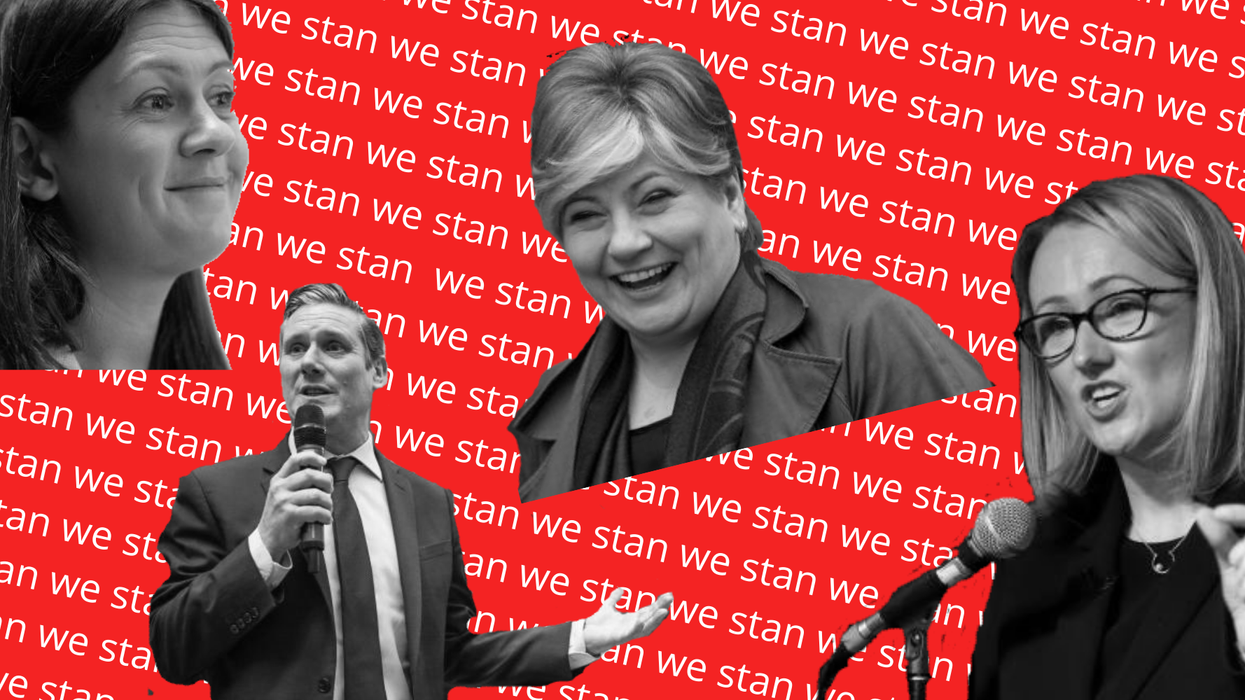Joanna Taylor
Jan 29, 2020

Getty/Reuters
It's 2020 so of course politicians have stans. Stanning is bringing an entire new language and culture into the world of politics: but is it making a difference?
To start with the basics, a stan is someone who lives and breathes for something or someone, usually a band or singer: the word comes from an Eminem song about a dangerously obsessive fan. Celebrities in turn cultivate their stan armies, giving them nicknames like Ariana Grande's Arianators or Beyoncé's Beyhive.
Diehard fans aren't a new phenomenon, but teenagers and young people have brought their own particular flavour and shared language to stanning, like speaking exclusively in hyperbole and posting out-of-context K-pop GIFs. Stanning is actually particularly associated with K-pop following the meteoric rise of BTS, the South Korean pop group that conquered the international music scene.
The big problem with stans is that you're either with them or against them. If a stan army doesn't like something you say, there's no escaping them. Twitter gives stans ready access to the people they wish to target and a direct line to the celebrities they worship.
It's no surprise, then, that stan culture has a place in politics. Elections are emotional. We root for our fav against who we perceive as the enemy. We cry when they lose. We rejoice when they win.
The current Labour leadership race is basically a stan war. People are gathering around their preferred candidates and posting memes and tweets in their favour.
These can be significant.
Lisa Nandy didn't even have to consciously create her memorable Queen of the Towns persona: her stans did it for her.
Emily Thornberry has also created a stan army, particularly those who proclaim herself a gay icon. She cemented this image by attending the UK Drag Race finale while on the election campaign trail.
Last week, Jess Phillips pulled out of the race. While she certainly had loyal fans, her election campaign failed to resonate with the typical young, hard-left Labour stan, particularly owing to accusations of transphobia (although she has since addressed these and come out in support of trans rights).
Many stans are also passionate about social justice, although this of course varies based on who they are what they're stanning.
According to Britain Elects, before dropping out Phillips was polling at 9 per cent behind front runner and stan favourite Rebecca Long-Bailey.
But does stan culture really have anything to do with this?
Of course, ideological candidates like Jeremy Corbyn and potentially Rebecca Long-Bailey are elected to leadership positions by avid supporters within their party. Backing candidates like these isn't playing it safe or picking someone based purely on likelihood of election success, but because of real belief in their potential.
But supporters aren't the same as stans. High concentrations of exaggeration and irony are typical of stanning as well as, in some instances, sexual attraction.
A perfect example of this in politics was the #Milifandom, where attraction and irony were perplexingly conflated. This is also an example of stanning making a real difference in politics: Abby Tomlinson created an entire army of teenage girls posting pictures of Ed Miliband in flower crowns at a time when his public image largely rested on a bacon sandwich.
While it might not have translated to an election victory, the #Milifandom was certainly impactful and contributed significantly to Miliband's softboi vibes.
Grime4Corbyn and the Stormzy effect similarly failed to result in the youthquake we were constantly promised for Jeremy Corbyn, but it did lead to a modicum of optimistic press coverage at times when Corbyn was roundly hated by most corners of the press and public.
So no, stan culture hasn't taken over politics inasmuch as it hasn't resulted in real shifts in polling numbers. As much as memes, TikToks and shitposting are all now par for the course in election campaigns, the turnout of young voters is still relatively low.
In some senses, in fact, the opposite is true. The detractors of people like Jeremy Corbyn and Bernie Sanders weaponise the passion of young and hard-left voters and turn it back against them, accusing them of zealousness. Unlike Arianator, the collective term for Corbyn fans, Corbynistas, has markedly negative connotations and they were called a 'cult' by respected, influential commentators innumerable times during the 2019 election campaign.
This is ironic, given the fact that Boris Johnson actually has a cult of personality while Jeremy Corbyn largely does not. Like Cher or Madonna, Johnson is referred to by his first name and his fans fawn over his 'hilarious' Borisisms.
Corbyn stans are obsessed with how far left he brought the Labour Party and the policies he suggested to do this. It was hard to care about Corbyn's actual personality: the most he gave away in interviews was that he has an allotment and a bike, and likes jam.
Johnson, meanwhile, has jokingly compared himself to a "Korean dictator" in the Commons and repeated absurd phrases like "oven-ready Brexit" and "get Brexit done" to the point where they're permanently stamped in all of our brains.
Rather than election success, what stan culture has really brought to politics is a shared language for a particular sector of young people. Pollsters, politicians and commentators like to gatekeep politics as 'their' thing, affectionately referring to themselves as politics nerds and insisting that it's boring to everyone else.
What this does is shut out everyone who isn't middle class and middle aged – the demographic that is disproportionately represented in politics and act like they own it.
Stan culture turns the tables back on this sort of person, so that, for instance, Laura Kuenssberg has to try (and fail) to explain what shitposting is.
While obviously there are young people in mainstream politics who are taking part in mainstream political discourse, stan culture offers a route in with language and references that belong to their demographic.
Stans are offering alternative political commentary for a digital world and unapologetically stanning their favs.
Sorry not sorry.
MORE: Meet the man behind the hilarious 'Tory Hunger Games' account that's about to go viral
MORE: Rebecca Long-Bailey just pretty much admitted she’s smoked weed and people are finding it hilarious
Top 100
The Conversation (0)













